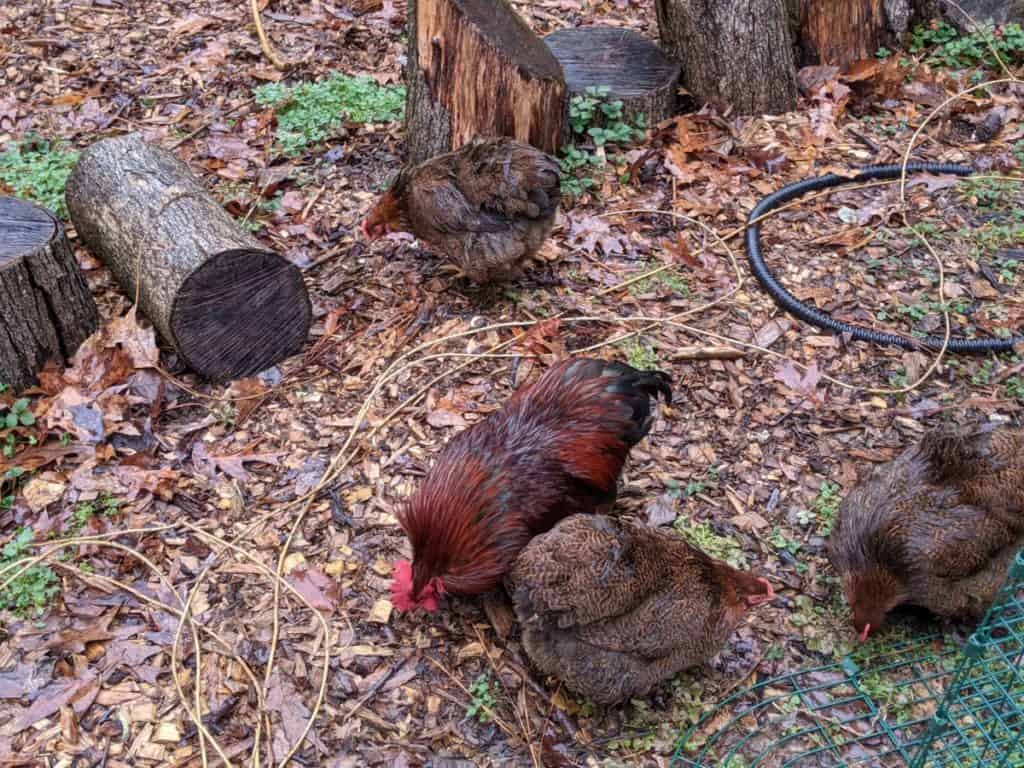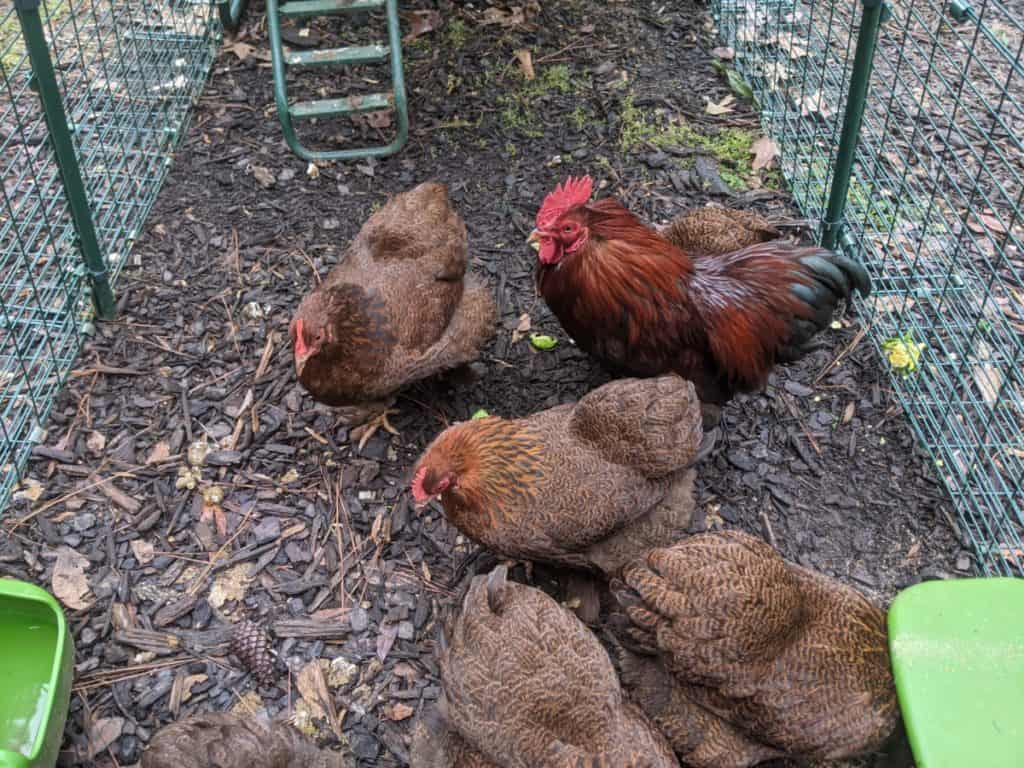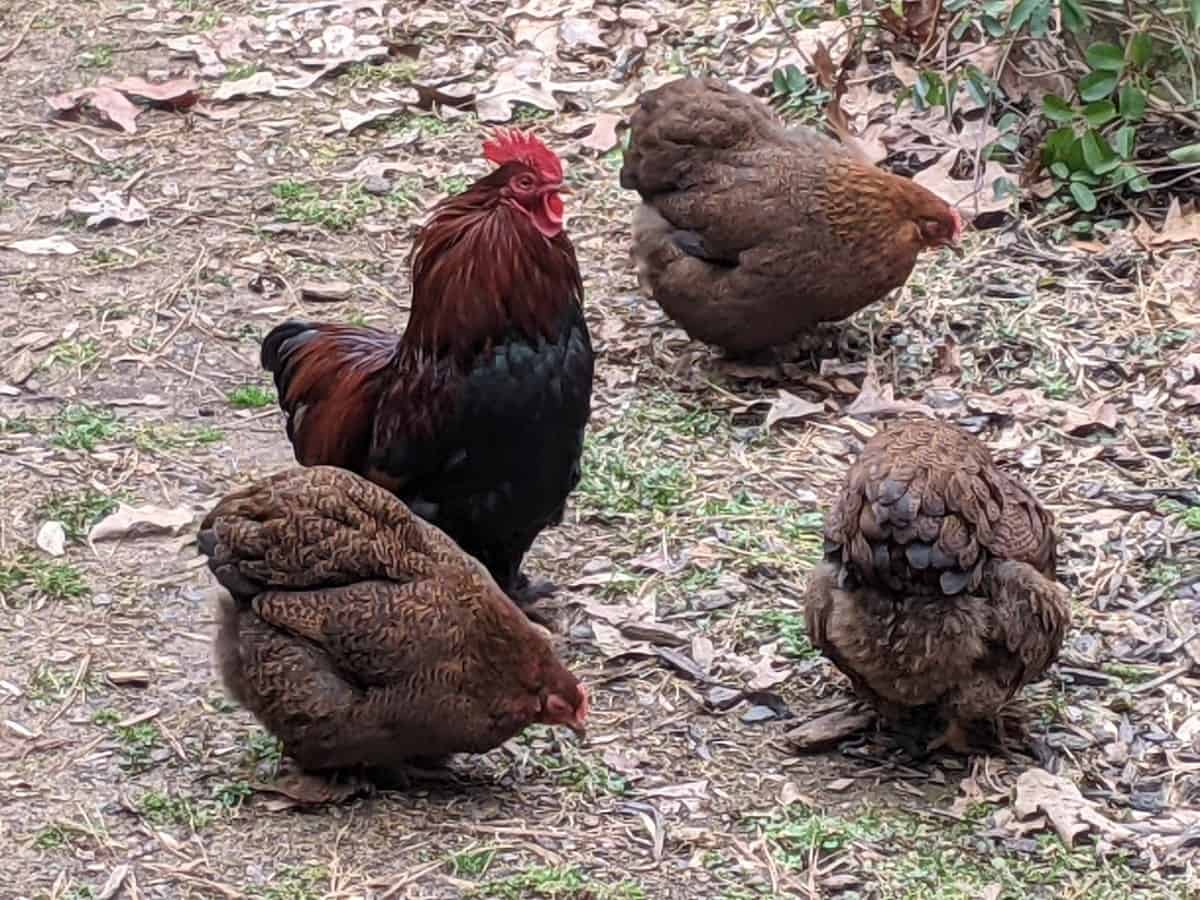Chickens are social birds and are naturally inquisitive. They use their beaks to explore in the same way we use our hands – pecking at objects in their surroundings or often at members of their flock.
While hen pecking is a natural behavior and helps to establish the social order in a flock, it can escalate to chicken bullying!
Overcrowding, overheating, too much light, poor nutrition, competition for food, water, roosts, or nesting boxes, stress, and boredom are the most common causes for aggressive pecking. Address these issues, and if that fails, isolate the offending chicken for a week to re-establish the pecking order.
Watching your chickens hurt one another is upsetting and you need to address the problem as soon as possible. It is a matter of life and death, as chickens can and will kill each other.
It is important to observe your chickens and figure out the underlying cause of the pecking behavior. It may just be natural pecking order behavior, but it could be that you have a bully in your flock.
Chickens have a pecking order
In the wild, chickens live in flocks of about a dozen hens and one rooster. To maintain peace within the flock, chickens naturally establish a social hierarchy or pecking order. This system determines which hens can eat or drink first, get the premium roost spots or nest boxes. Our backyard flocks also abide by this system.
A chicken’s social status in the flock is determined by a complex variety of factors – age, size, color, and individual personality. From the time they hatch, chicks establish their rankings.
Chickens that are introduced into a flock will start at the bottom of the ranks and over time find their place in the pecking order by dominating other, more timid chickens. Some chickens are more ambitious than others and will quickly rise to the top.

Pecking order behavior vs chicken bullying
Pecking behavior is normal and is not always aggressive. Watching hens peck each other gently is cute, but how do we know the difference between normal hen pecking and chicken bullying?
When you introduce a new chicken to your flock, it is normal for there to be some pecking. The other chickens will come and inspect the newcomer, who will either be submissive or assertive. The newbie may challenge other chickens to assert her rank. This is pecking order behavior and it will naturally stop when the social hierarchy has been re-established.
Chicken bullying is altogether different. It is aggressive behavior that does not have a social purpose. The perpetrator will stop the victim accessing food or water, will peck at them, pull their feathers out and may jump on them to attack. The poor chicken bearing the brunt of the bullying will lose weight, feathers and will have low energy.
They may not even want to go into the coop at night. If you notice one of your chickens behaving more stressed or anxious than usual, or if a chicken that usually runs up to you for a cuddle suddenly stops, there may be a bullying problem in the flock.
Determine the cause of pecking to stop it
The first step on how to stop chickens from pecking each other is to determine the root cause of the behavior. There are several common reasons that chickens peck each other:
1. Overcrowding of your chickens
This is the most common cause of bullying. You may be an impulse chicken buyer, like me, or hatch a few too many and do not have the heart to rehome them.
This usually is not a problem for a free-ranging backyard flock for most of the year, but in winter, when chickens tend to stay inside the coop more, it can cause more assertive hens to start pecking and bullying more submissive ones.
Ensure that your coop is big enough for your flock – each bird should have 4 square feet of room inside the coop and 8 square feet outside in the run.
2. Competition for nesting boxes.
When chickens lay their eggs, it is a vulnerable time for them, and they will look for a safe space where they can comfortably lay. Higher-ranking hens will compete with flock members, bullying them out of a nesting box, if there are not enough of them. A good rule is to have one box for every three hens.
3. Chickens running out of water or food
Chickens get stressed when they run out of resources and this can cause aggression. Do not restrict the amount of feed and water you give chickens. Keep some available to them all day and even in their coop at night.
4. Too Large of a flock size
In the wild, chickens live in flocks of around a dozen. If your backyard flock grows too large, problems will arise. In big flocks of 30 or more, chickens find it more difficult to establish a pecking order, which leads to stress, anxiety, and heightened aggression towards one another.
5. Chickens Overheating
If chickens are feeling hot and bothered, it can cause bullying. They get uncomfortable and frustrated and relieve themselves by pecking and bullying their flock mates.
6. Nutritional deficiency in the flock
If chickens are lacking something in their diet, it can cause pecking and feather pulling. A lack of salt will cause them to peck at the back of other chicken’s necks, where the preen gland is.
The preen gland secretes an oil that they use to groom themselves, but it tastes salty, so they peck at it to compensate for their deficiency. If they lack protein or calcium, they will peck and pull at feathers.
7. Parasites in flock
Handle your chickens often and check them for mites and lice, as this may be the reason they are being targeted.
8. Injured or sick chickens
If a chicken is sick or injured, the other flock members will peck at them aggressively to drive them away. It may seem fickle and mean, but chickens behave this way because, in the wild, a sick or injured chicken is a liability for the flock.
9. Environmental stress in chickens
The presence of predators, barking dogs, moving to a new coop, the addition of a new chicken to the flock, a sudden change of feed, or the death of a flock member are all stressors for chickens.
Too much lighting in the coop at night is also stressful to them. High-stress levels can trigger aggression and cause even docile hens to behave out of character.
10. Boredom
Chickens may be bullying each other because their minds are not stimulated enough, and they can’t carry out their natural instincts.

Stop chickens from pecking each other
If you need to stop a chicken from being attacked in the moment, squirt the antagonist with a water pistol or make a loud noise to distract them. This is merely stopping the behavior in the short term and does not address the root of the problem.
It is your responsibility to spend time watching your flock and learning about their behavior. Once you have figured out why your chickens are pecking at each other, you can address the issue, and the behavior should decrease and stop over time.
The best way to keep chicken bullying under control is by providing your flock with enough space and resources so that they do not feel the need to compete. Have several feeders and waterers available, so that low-ranking chickens are not prevented from reaching these resources by dominant hens.
Also put interesting objects, branches, swings, vegetables, or toys into their coop and run to curb boredom, especially during winter.
If the bullying is due to their environment, reduce your chicken’s stress by ensuring they have enough room to move around, feeders and waterers, roosts, nest boxes, and that their coop or run does not overheat.
Provide them with shade and extra water during the hot summer months. Control external stressors, like barking dogs or loud machinery near the coop. Keep your flock size below 30 birds.
Address pecking due to nutritional deficiencies by feeding them a high-quality layer feed, giving them scratch grains and grit, and always keeping their water containers full.
If a hen is targeted due to ill health, separate her from the flock and ensure she gets proper medical treatment.
Provide your flock with dust baths to keep them clean and free of parasites. Fill a large enough container with sand, soil, wood ash, and some diatomaceous earth and mix thoroughly. Chickens will instinctively roll around in this to clean themselves.
If you have made all the necessary changes and the bullying continues, you will have to remove the perpetrator and keep them isolated for a week or so. This will reset the pecking order.
Conclusion
It is important to distinguish normal henpecking from bullying and to find the reason chickens are pecking each other. The most common causes are overcrowding, sickness, stress, and boredom. Address the root cause of the issue by making the necessary changes to their environment.





